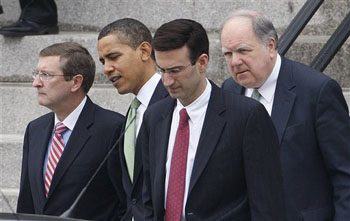|
by Michael Salla, Ph.D.
March 25, 2009
This week Congress votes on President Obama’s proposed $3.6 trillion budget plan for fiscal 2010.
Obama plans to lobby both the Houses of Representatives which votes today and the Senate which votes later in the week. Republican opposition is mounting with a report released last Friday by the Congressional Budget Office saying that Obama’s budget revenue projections are too optimistic and may increase the deficit by 9.3 trillion over the next decade.
Only deep spending and tax cuts make Obama’s budget realistic, according to Republican critics. On the other side of the political divide, Democrats are saying corporate bailout funds and tax cuts need to be sacrificed to balance the federal budget. Only then can essential social services such as education, health and transportation be provided in a responsible manner.
There is a third way to scale back the federal deficit while maintaining essential services at responsible levels.
President Obama can expose America’s second ‘black budget’ so that corruption and inefficiencies in executive agencies and departments can be permanently removed.
President Obama walks with,
Senate & House Budget Committee Chairs Photo: AP
The ‘official’ black budget comprises single line items in the Department of Defense (DoD) budget that don’t refer to any real weapons system.
These single line items are covers for a Congressionally sanctioned and publicly funded ‘black budget’ – a top secret slush fund for intelligence organizations such as the CIA, and classified weapons programs by the DoD.
There is, however, a second black budget that is
not congressionally sanctioned, but it is nevertheless publicly funded –
America’s ‘unofficial’ black budget.
There is however compelling evidence that the
covert world of highly classified projects is primarily funded by a black
budget created by the CIA rather than the DoD. Rather than being a
beneficiary of a Congressionally sanctioned DoD ‘black budget’, the CIA has
its own ‘unofficial’ black budget. The CIA’s black budget is a conduit for
funds secretly siphoned into the various military intelligence agencies and
private contractors associated with both the CIA and the DoD, for
intelligence activities, covert operations, and weapons research and
development.
Every year, according to Catherine Austin Fitts, a former Assistant Secretary of HUD (United States Department of Housing and Urban Development), billions of dollars of Congressional appropriations are diverted from their Congressionally sanctioned purposes to CIA and DoD based intelligence agencies without knowledge of the public and with the collusion of Congressional leaders.
The covert world of ‘black programs’ acts with
virtual impunity, overseen and regulated by itself, funding itself through
secret slush funds, and is free of the limitations that come from
Congressional oversight, proper auditing procedures and public scrutiny.
Such siphoning, with dubious constitutional status, is made legal by various Congressional enactments, senior Congressional officials, and the Executive Office.
The size of the Black Budget, the secrecy surrounding it, the extent senior Federal officials and agencies go to in targeting individuals and companies threatening to reveal where Congressional appropriations are ultimately going, point to a vast network of ‘deep black projects’.
This network collectively forms a highly classified second Manhattan Project whose existence, goals and budget are kept secret.
My new book,
Exposing U.S. Government Policies on Extraterrestrial
Life reveals this new Manhattan Project is a network of
projects in the U.S. and around the world dealing with
extraterrestrial life
and
technology.
Only then can U.S. government agencies and departments truly balance their budgets, and provide the public with responsible social services that public tax dollars more than amply cover. Exposing America’s second black budget is no longer just a moral imperative, but is now an economic necessity.
President Obama needs to deal decisively with his second black budget problem so that his 2010 and future budget proposals are financially viable.
from YouTube Website
|

